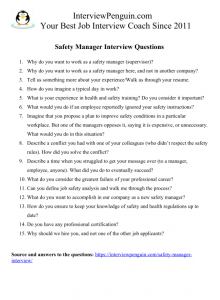Employees’ safety is one of the priorities of each corporation, small or big, private or public. They do not have another option, however, since they have to follow safety and environmental rules, and adhere to respective guidelines. But how to build the culture of compliance, health and safety in the workplace, while maintaining the highest possible productivity of employees?
That will be your task. Safety manager (or supervisor) is an excellent job. You will enjoy both independence and responsibility, and your word will have a power to change something (whether for a particular employee, or for an entire organization). Let’s have a look at the questions they will ask you in your interview, and how to get the most out of this opportunity.
Table of Contents
Why do you want to work as a safety manager (supervisor)?
A typical answer is that you graduated from the field of safety management, and have the skills and experience to handle the job.
While not necessarily a bad answer, you can come up with something better. Saying that you want this job because you have earned your degree in the field (and invested both time and money to your studies) indicates a must. But you want to show a desire.
I suggest you to speak about your passion for improving health and safety of the employees, about your honest interest in the field, about the meaningful purpose you see in the job of a safety (and health) manager.
You can say that you have always found this field interesting, and that’s why you pursued your degree. A job you try to get now is the next step on your career plan.
What is more, you can say that you believe to have the abilities (attention to detail, independence, responsibility, excellent communication skills) that make from you a superb candidate for the job.
Why do you want to work as a safety manager here, and not in another company?
You have several options for a good answer. First one is connecting their field of business with your expertise, experience, or interest. Let me explain.
If you apply in an automotive company (producing cars or components for cars), you can say that you love cars and always wanted to be involved in the production of them. Or, if you did your internship in another corporation involved in automotive, or had subjects related to the field at school (or studied it in your free time and are perfectly aware of the health & safety standards), you can say that it matches your experience or expertise.
Another option is praising something about the company–something that makes them a great place for work. Perhaps the employee benefits, their reputation, working environment, anything. Researching a bit about your future employer online can help you understand these things.
Last option is simply being honest. Perhaps you chose the company because they have the best salary offer, or the production plant stands near your apartment and you won’t waste too much time commuting to work. Honesty can do wonders in some interviews. Perhaps you can try it with this question.
Tell us something more about your experience/Walk us through your resume.
Here you can face two possible scenarios: either you have relevant experience or you don’t. Let’s look at the first one.
If you worked as a safety officer, manager, coordinator, or supervisor before, try to explain the core duties you were responsible for. If you managed to devise an effective health and safety plan, you can talk about it briefly (especially about some interesting/innovative ideas you implemented in the plan).
You should always talk positively and with enthusiasm about your past occupations.
If you do not have any previous experience in the field, however, you should focus on your education, and practical subjects you had at the college (or on your internship). In this case you should show some confidence, telling the hiring managers that despite your lack of experience you have excellent knowledge of guidelines and laws, and feel ready to start the job.
At the end of the day, everyone has to start somewhere. This is your chance and your place…
* Special Tip: Download the full list of questions in a one page long PDF, print it, and practice your interview answers anytime later:

How do you imagine a typical day in work?
The most important thing is to show a proactive approach to work. You shouldn’t sit in your office, waiting for an accident to happen… Prevention is the word to remember.
Say that you imagine walking in the halls (offices, production sites, warehouses, etc), inspecting the working conditions, trying to identify possible hazards, keeping your eye on the employees (whether they adhere to safety regulations, etc).
Of course you will spend time also in the office, analyzing risks and devising new plans, with the help of your computer. Administrative work belongs to this job, like to any other one. But the most important part happens always in the workplace, and you should convince the interviewers that there’s where you plan to be…
* May also interest you: Compliance officer interview questions.
What is your experience in health and safety training? Do you consider it important?
Unless the employees are aware of the safety regulations, it makes no sense to have any regulations in place. Training isn’t only important–it is essential.
Ensure the interviewers that you have excellent communication skills, can explain things in a simple way, and adjust your communication (choice of words, style, speed) to the intelligence and knowledge of the recipient of your message.
Said in simple words, you believe to be able to explain anything to anyone in the company. And you plan to devote a part of your time to training employees, or to instructing a training specialist (other responsible person) on how to lead the safety training with new hires.
What would you do if an employee reportedly ignored your safety instructions?
Each job has some limits. Your duty is to prepare safety instructions, and to instruct employees on how they should follow them in work. And to inspect whether they actually do follow them.
But that’s the end. You can’t dismiss an employee–it’s someone else’s job.
I suggest you to say that you’d follow the following steps:
- You’d repeatedly ensure that the employee understands the safety instructions.
- You’d warn them about possible consequences of not obliging the rules, and ask them to remedy their behavior immediately.
- If this didn’t work, you’d report their behavior to their supervisor or to one of the HR managers, and suggest a disciplinary measure (can be cutting their bonuses, penalizing them, or in more serious cases firing them).
Imagine that you propose a plan to improve safety conditions in a particular workplace. But one of the managers opposes it, saying it is expensive, or unnecessary. What would you do in this situation?
Once again, this job has some limits. You can propose whatever you want, but you do not control the budget. Having said that, you shouldn’t give up easily.
Say that you would have a one on one with the manager. You would explain them the benefits of the plan, and how a company can actually save money applying it, at least it in a long run (saving money in accident compensations, attracting better employees who seek safer conditions in the workplace, etc).
Of course, if you follow the latest update to the laws and regulations, and it is more a must than an option to move forward with the plan (unless the company wants to face a possibility of paying a hefty fee after the next safety audit), you should clearly explain this to the manager.
You would simply do your best to convince them, and then let them to have the final call–because that’s how it works in a corporate hierarchy…
Some other questions you can face in your safety manager (supervisor) interview
- Describe a conflict you had with one of your colleagues (who didn’t respect the safety rules). How did you solve the conflict?
- Tell us about a time when you had to comply with a rule or policy you did not agree with.
- Describe a time when you struggled to get your message over (to a manager, employee, anyone). What did you do to eventually succeed?
- Have you ever worked on a project that was a failure?
- Can you define job safety analysis and walk me through the process?
- What do you want to accomplish in our company as a new safety manager?
- How do you ensure to keep your knowledge of safety and health regulations up to date?
- Tell us about a time when you had to make a decision without having all information you needed.
- Describe a time when you used persuasion to successfully convince someone.
- ….
Conclusion and next steps
Interview for a Safety Manager position belongs to job interviews with average difficulty.
The questions won’t be easy, but you typically won’t compete with more than three or four other people for the job–which makes your situation easier (especially when compared to other managerial roles, such a management trainee or marketing manager, where one often competes with dozens of other applicants).
Do some research about your future place of work, and relevant safety regulations and laws. You should also read the article once again, and try to write down a short answer (or at least a concept for an answer) to each question. If you cannot come up with good answers on your own, have a look at our Interview Success Package. Up to 10 sample answers to all tricky interview questions (including scenario based questions) will help you ace this interview, and outclass all other job applicants.
Luck favors the prepared mind. This isn’t a superbly difficult interview, and if you spend enough time preparing for it, you should make it. I wish you good luck!
Matthew
May also interest you:
- Tell me about a time when you faced an ethical dilemma.
- Describe a situation when you had to comply to a policy or procedure you didn’t agree with.


